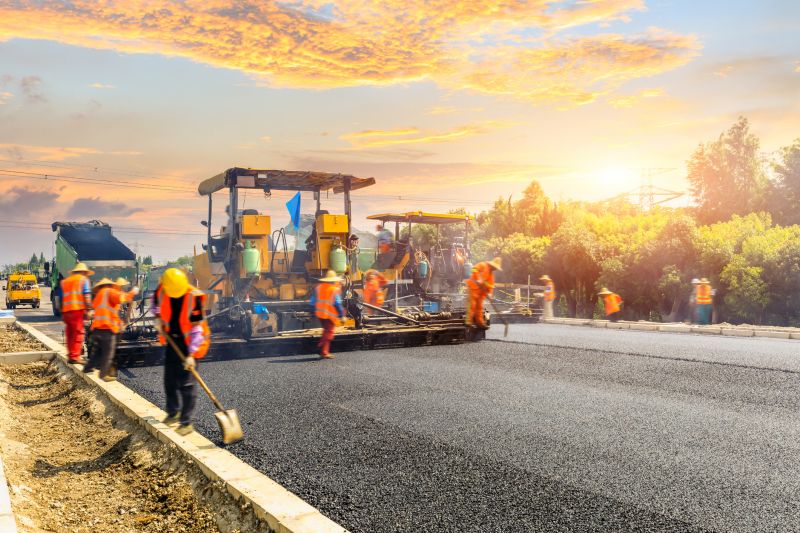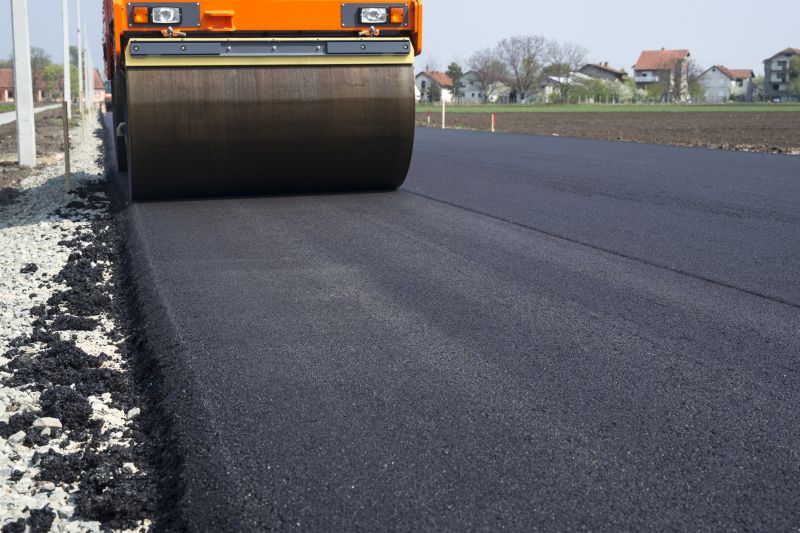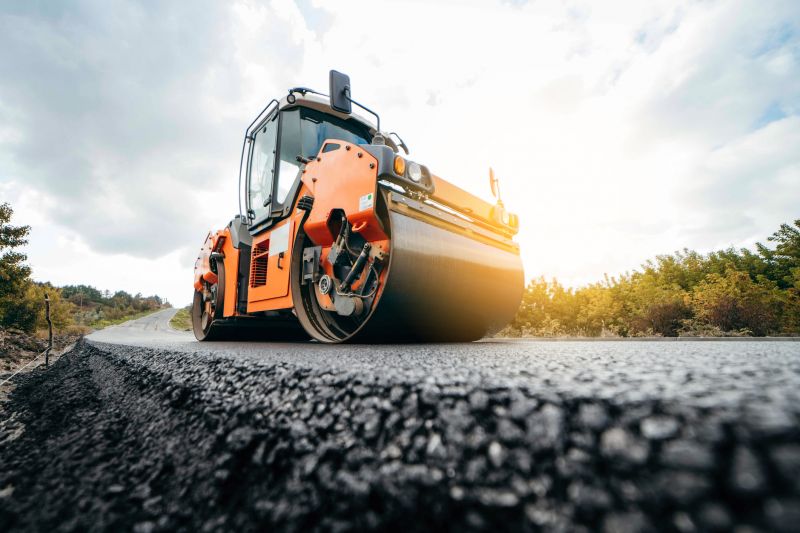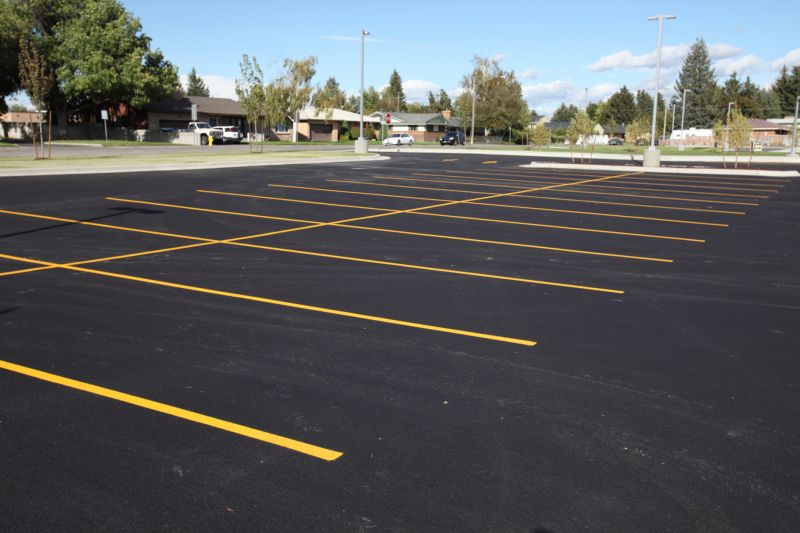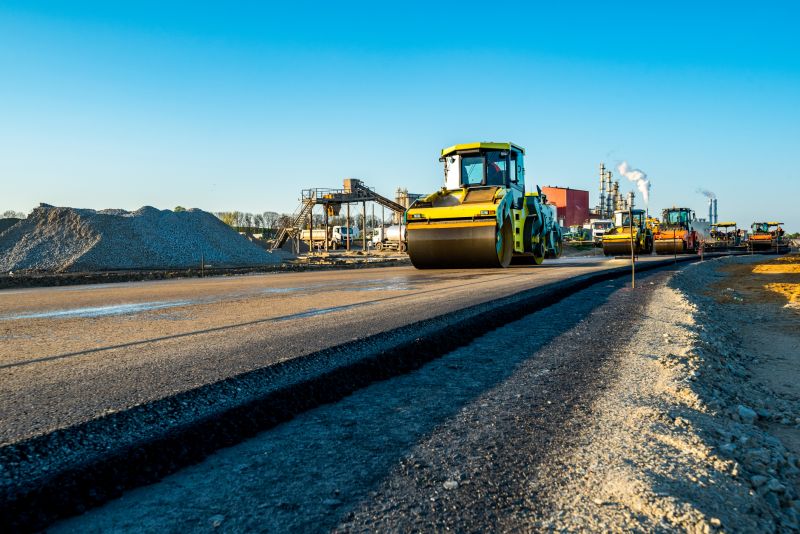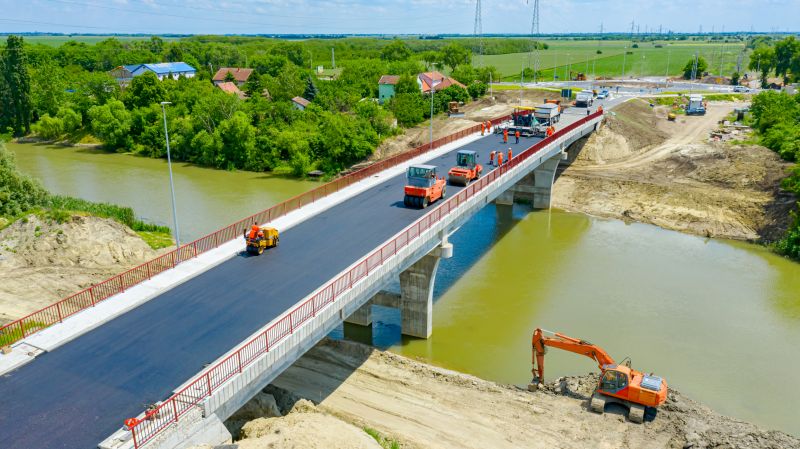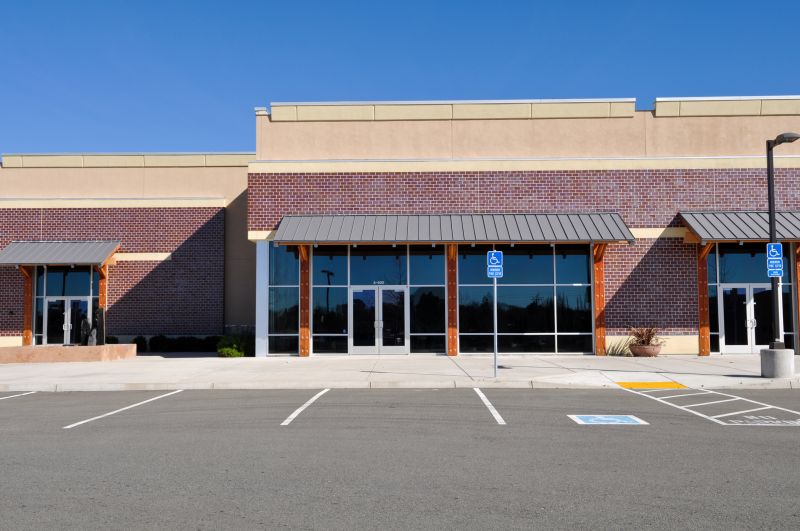Road Paving Project Supplies and Materials
Get help with your road paving needs. Fill out the form above and we will connect you with local pros in your area. Road paving requires a wide range of tools and materials to ensure a smooth and durable surface. Asphalt is the primary material used for road paving, which is a mixture of aggregates, binder, and filler. The first step in the road paving process involves preparing the ground, and for this, excavators and bulldozers are used to clear the site and create a level surface. Once the ground is ready, pneumatic rollers and compactors are utilized to compact the soil and create a solid foundation.
To lay the asphalt, asphalt pavers are used. These machines spread and level the hot asphalt mixture evenly across the road surface. Asphalt rakes and lutes are then employed to further smooth and distribute the asphalt. Tack coat is applied to promote adhesion between the existing road surface and the new asphalt layer.
In order to achieve precise measurements and ensure proper slope and grade, surveying equipment such as total stations and GPS systems are used. String lines and line lasers are also employed to guide the paving process and maintain accuracy.
Other essential tools for road paving include road saws for cutting through existing pavement, power brooms to clean the surface before paving, and hand tampers for compacting smaller areas. Traffic cones, barricades, and safety vests are necessary for establishing a safe work zone and directing traffic during the construction process.
Various materials are used to enhance the durability and longevity of the road. These include asphalt emulsion, sealants, and crack fillers to prevent water infiltration and protect the pavement from damage. Geotextiles are also used to reinforce the road structure and improve its strength.
In addition to the tools and materials mentioned above, road paving projects may require traffic paint for line marking, thermoplastic for durable road markings, and reflective glass beads to enhance visibility at night. Traffic signs, guardrails, and curbs are also important components to ensure road safety and proper traffic flow.
Overall, road paving is a complex process that requires a diverse range of tools and materials. Each product plays a crucial role in achieving a well-constructed and long-lasting road surface.
Asphalt is a versatile and durable material that is commonly used for road paving. Its unique properties make it an ideal choice for constructing roads and highways. The process of road paving with asphalt involves laying a hot mixture of asphalt, aggregates, and other additives onto a prepared surface. This mixture is then compacted to create a smooth and sturdy road surface. Asphalt's flexibility allows it to withstand heavy traffic loads and temperature fluctuations, making it resistant to cracking and rutting. Additionally, its dark color helps to absorb heat, reducing ice and snow accumulation during winter months. Overall, asphalt is a reliable and cost-effective solution for road paving, providing a safe and long-lasting infrastructure for transportation.
Excavators play a crucial role in the road paving process by efficiently preparing the ground and ensuring a solid foundation for the construction of new roads. These versatile machines are used to excavate and remove any existing materials, such as rocks, debris, or old pavement, from the road surface. They can also be used to dig trenches for utility lines or drainage systems, ensuring proper infrastructure is in place. Excavators equipped with specialized attachments, such as buckets or breakers, can easily break up and remove hard surfaces like concrete or asphalt. This allows for the smooth removal of old road materials, making way for new layers to be laid down. Moreover, excavators are instrumental in grading and leveling the ground to create a uniform and even surface for road paving. They can efficiently move and distribute soil or aggregate materials, ensuring proper compaction and stability. This process is essential to prevent future road damage and ensure a durable and long-lasting road surface. Overall, excavators are indispensable machines in the road paving industry, as they provide the necessary power, precision, and versatility to effectively prepare the ground and facilitate the construction of high-quality roads.
Bulldozers are versatile and powerful machines that play a crucial role in road paving projects. These heavy-duty vehicles are used to prepare the construction site by clearing and leveling the ground, removing any obstacles or debris. With their robust blades, bulldozers can efficiently grade the soil and create a smooth and even surface for the road. During the road paving process, bulldozers are also employed to push and distribute materials such as gravel, asphalt, or concrete. They help in spreading these materials evenly across the roadbed, ensuring proper compaction and stability. Bulldozers can also be equipped with specialized attachments like rippers or compactors to further enhance their capabilities in road construction. Moreover, bulldozers are essential in shaping the road's alignment and contours. They assist in creating slopes, embankments, and ditches, allowing for proper drainage and preventing water accumulation on the road surface. Their immense power enables them to handle heavy loads and maneuver through various terrains, making them indispensable in road paving projects of all sizes. In summary, bulldozers are indispensable machines in road paving, as they facilitate site preparation, material distribution, and shaping of the roadbed. Their versatility and strength make them a valuable asset for efficient and effective road construction.
Pneumatic rollers are versatile and efficient machines that play a crucial role in road paving projects. These rollers are equipped with rubber tires filled with air, allowing them to exert even pressure on the surface being paved. During road paving, pneumatic rollers are used to compact and smooth the asphalt or other paving materials. They help in achieving proper density, ensuring a durable and long-lasting road surface. The rubber tires provide excellent traction and flexibility, enabling the roller to maneuver easily around curves and tight spaces. Pneumatic rollers are particularly effective in compacting hot mix asphalt (HMA) because the air-filled tires distribute the weight evenly, preventing surface damage. They also help in achieving uniform compaction across the entire pavement surface, eliminating any potential weak spots or inconsistencies. In addition to compaction, pneumatic rollers can also be used for sealing and finishing touches. They can be fitted with water sprinkler systems to cool down the asphalt and prevent it from sticking to the tires. This feature is especially useful during hot weather conditions. Overall, pneumatic rollers are essential tools in road paving projects, ensuring smooth, durable, and high-quality road surfaces that can withstand heavy traffic and environmental factors.
Compactors are essential equipment used in road paving to ensure a smooth and durable surface. These heavy machines are designed to compress and compact various road materials, such as asphalt, gravel, and soil, to achieve the desired density and stability. During road paving, compactors play a crucial role in several stages of the process. Firstly, they are used to prepare the ground by compacting the soil or sub-base layer, ensuring a solid foundation for the road. This helps to prevent future settlement or unevenness. Once the base layer is ready, compactors are then employed to compact the asphalt or other surface materials. This process helps to eliminate air voids and increase the density of the material, resulting in a stronger and more durable road surface. Compactors also help to achieve proper smoothness and evenness, ensuring a safer and more comfortable driving experience. There are different types of compactors available for road paving, including vibratory rollers, pneumatic rollers, and tandem rollers. Each type has its own unique features and advantages, allowing them to be used in various road construction projects. In summary, compactors are indispensable tools in road paving, providing the necessary compaction and density required for a long-lasting and high-quality road surface.
Asphalt pavers are essential machines used in road paving projects. These heavy-duty vehicles are designed to efficiently and accurately lay asphalt on roads, highways, and other paved surfaces. Asphalt pavers use a combination of conveyor systems, augers, and screeds to distribute and level the hot mix asphalt (HMA) onto the prepared surface. They ensure a smooth and consistent application of asphalt, resulting in durable and well-constructed roads. With their precise controls and advanced technology, asphalt pavers can handle various road widths and thicknesses, allowing for customization based on project requirements. Whether it's a new road construction or resurfacing project, asphalt pavers play a crucial role in achieving high-quality and long-lasting road surfaces.
Asphalt rakes are essential tools used in road paving projects to ensure a smooth and even distribution of asphalt material. These specialized rakes are designed with sturdy, heat-resistant tines that can withstand the high temperatures of freshly laid asphalt. During road paving, asphalt rakes are used to spread and level the hot mix asphalt (HMA) across the surface. The rake's long handle allows workers to reach areas that are difficult to access, ensuring consistent coverage and thickness throughout the project. The tines on the asphalt rake help to evenly distribute the asphalt material, preventing any clumps or uneven spots. By using the rake to spread and smooth the asphalt, it helps to create a uniform and well-compacted surface, which is crucial for the longevity and durability of the road. Additionally, asphalt rakes are also used for fine-tuning the surface, ensuring proper drainage and eliminating any imperfections. Workers can use the rake to remove excess material or redistribute it to areas that need additional asphalt. Overall, asphalt rakes play a vital role in road paving by facilitating the precise application of asphalt, resulting in a well-constructed, smooth, and durable road surface.
Lutes, also known as asphalt rakes, are essential tools used in road paving projects. These long-handled rakes are specifically designed to spread and level asphalt during the paving process. With their sturdy construction and wide teeth, lutes effectively distribute the hot asphalt mixture evenly across the surface, ensuring a smooth and durable road. When working with lutes, road construction workers can easily manipulate and control the asphalt, allowing for precise placement and compaction. By using a lute, they can spread the hot mix evenly, ensuring consistent thickness and preventing any potential weak spots or irregularities in the pavement. Lutes are not only efficient but also versatile tools. They can be used for various road paving tasks, such as leveling, smoothing, and finishing the asphalt surface. Additionally, lutes are often adjustable, allowing workers to customize the angle and pitch of the teeth to achieve the desired pavement texture and finish. In summary, lutes play a crucial role in road paving by helping construction crews efficiently spread and level asphalt, resulting in well-constructed and aesthetically pleasing roads.
Tack coat is an essential component in road paving that acts as a bonding agent between layers of asphalt. It is a thin layer of bitumen emulsion or asphalt binder that is applied to the existing pavement surface before placing the new asphalt layer. Tack coat improves the adhesion between the old and new asphalt layers, ensuring a strong and durable road surface. By applying tack coat, it helps to prevent slippage and separation between the layers, reducing the risk of premature pavement failure. It also helps to seal any existing cracks or imperfections in the pavement, providing a smoother and more even surface for the new layer of asphalt. Tack coat is typically sprayed or spread evenly onto the existing pavement using specialized equipment. It is important to apply the correct amount of tack coat to achieve optimal bonding and avoid excess or insufficient application. Overall, tack coat plays a crucial role in road paving by enhancing the longevity, stability, and performance of the pavement, resulting in safer and more reliable roads for drivers and pedestrians.
Surveying equipment plays a crucial role in the road paving process by providing accurate measurements and data to ensure the construction of high-quality and durable roads. It is used to determine the topography, alignment, and grade of the road, as well as to establish reference points and benchmarks for precise leveling. Surveying equipment such as total stations, GPS receivers, and laser scanners enable engineers and construction teams to create detailed road designs, calculate earthwork quantities, and monitor the progress of construction. By utilizing surveying equipment, road paving projects can achieve optimal road alignment, proper drainage, and efficient use of materials, resulting in safer and smoother roads for motorists.
Total stations are advanced surveying instruments that combine electronic theodolites and electronic distance meters (EDMs) to measure angles and distances with high precision. In the context of road paving, total stations play a crucial role in ensuring accurate and efficient construction. Total stations are used in road paving to establish control points and accurately measure distances, angles, and elevations. They help surveyors and engineers in setting out the alignment and grade of the road, ensuring that it meets the desired specifications and design. By using a total station, road construction teams can precisely measure and stake out the road's centerline, edges, and other critical points, ensuring that the road is laid out correctly. This helps in achieving proper alignment, smooth curves, and accurate slope gradients, resulting in a well-constructed and safe road. Additionally, total stations can be used to monitor the progress of road construction by measuring the as-built conditions, comparing them with the design plans, and identifying any deviations or errors. This allows for timely adjustments and corrections, ensuring that the road is built according to the intended specifications. Overall, total stations are indispensable tools in road paving, providing accurate measurements, precise stakeout, and efficient monitoring, all of which contribute to the successful completion of road construction projects.
GPS systems can revolutionize the road paving process by providing accurate and efficient guidance. By integrating GPS technology into road paving equipment, construction crews can precisely measure and mark out the desired road alignment, ensuring accurate and consistent results. GPS systems can also assist in optimizing the distribution of materials, such as asphalt or concrete, by providing real-time data on the road surface and allowing for precise application. This not only saves time and reduces costs but also enhances the overall quality and longevity of the road surface. Additionally, GPS systems enable better project management and coordination by tracking the location and progress of paving equipment, ensuring smooth workflow and minimizing delays. Overall, GPS systems offer a powerful tool for road paving, improving accuracy, efficiency, and quality in the construction process.
String lines are an essential tool in road paving projects, providing precise guidance and ensuring accurate alignment. By setting up string lines along the edges of the road, construction crews can establish a straight and level reference point for the placement of asphalt or concrete. These lines act as a guide for the paver, ensuring that the road is laid evenly and with consistent width throughout the project. String lines help prevent deviations or irregularities, resulting in a smooth and seamless road surface. Additionally, they aid in maintaining proper drainage by ensuring the road slopes correctly. Overall, string lines are a crucial component in road paving, guaranteeing the highest quality and precision in construction.
Line lasers are invaluable tools for road paving projects as they provide accurate and efficient guidance for the entire process. By emitting a highly visible laser beam, line lasers create straight and level lines on the ground, ensuring precise alignment and consistency during road paving. These lasers can be mounted on paving machines or attached to a tripod for easy maneuverability and flexibility. Road workers can easily follow the laser line, resulting in evenly paved roads with clearly defined markings. Line lasers also enhance safety by reducing the chances of errors, minimizing rework, and enhancing overall productivity. With their ability to create straight and level lines, line lasers are an essential asset in the road paving industry.
Road saws are powerful tools specifically designed for road paving projects. These heavy-duty machines feature a circular blade with diamond-tipped teeth, capable of cutting through concrete and asphalt with precision and efficiency. Road saws are used to create clean and straight cuts in existing road surfaces, allowing for smooth and seamless repairs or expansions. By removing sections of the road, road saws enable the installation of new pavement, ensuring a strong and durable surface. With their ability to cut through tough materials, road saws are essential in road paving projects, providing a reliable and efficient solution for maintaining and improving our roadways.
Power brooms are essential tools in road paving projects, effectively removing debris, dirt, and loose particles from the surface prior to pavement application. These versatile machines feature rotating brushes that swiftly sweep away unwanted materials, ensuring a clean and debris-free base. By efficiently clearing the road surface, power brooms create an ideal foundation for the subsequent steps in road paving, such as asphalt application or chip sealing. With their ability to reach tight corners and edges, power brooms guarantee a thorough cleaning, enhancing the overall quality and longevity of the road. Whether it's a small repair or a large-scale construction project, power brooms play a vital role in achieving a smooth and durable road surface.
Hand tampers are essential tools for road paving projects. These compact and versatile devices are designed to compact and level the soil, aggregate, or asphalt during the construction or repair of roads. Hand tampers are operated manually and typically consist of a heavy metal plate attached to a handle. When working on road paving, hand tampers are used to achieve proper compaction of the materials being laid. They are particularly useful for small or tight areas where larger machinery cannot reach. By repeatedly striking the surface with the tamper, the operator can effectively compact the soil or aggregate, ensuring a stable and durable foundation for the road. Hand tampers are also used to level and smooth out uneven surfaces, ensuring a uniform and even road surface. This helps to prevent potential hazards such as potholes or uneven driving conditions. Overall, hand tampers play a crucial role in road paving projects by providing manual compaction and leveling, ensuring the quality and longevity of the road surface.
Traffic cones are essential tools used in road paving projects to ensure safety and efficient traffic management. These brightly colored, cone-shaped markers are strategically placed to guide vehicles and pedestrians away from construction zones, redirect traffic, and indicate temporary changes in road conditions. By creating a clear and visible separation between the construction area and the rest of the road, traffic cones help prevent accidents and provide a visual cue for drivers to slow down and exercise caution. Additionally, traffic cones can be used to mark specific areas for equipment storage, temporary parking, or detours, ensuring smooth flow of traffic during road paving operations. Their portability and ease of setup make them indispensable assets for road construction crews, enabling them to effectively communicate and manage traffic flow while maintaining safety on the job site.
Barricades play a crucial role in road paving projects, ensuring safety and efficient workflow throughout the process. These sturdy barriers are strategically placed to redirect traffic, protect workers, and control access to construction zones. By creating a physical barrier between motorists and the ongoing roadwork, barricades help minimize the risk of accidents and injuries. Additionally, they assist in maintaining a smooth flow of vehicles by guiding drivers through alternative routes and detours. With their highly visible colors and reflective surfaces, barricades enhance visibility during both daytime and nighttime conditions, ensuring motorists can easily navigate around the construction site. Overall, barricades are an indispensable tool in road paving, promoting safety, organization, and effective traffic management.
Safety vests are an essential piece of protective gear used in road paving projects. These high-visibility vests are designed to ensure the safety of workers by making them easily visible to motorists and other construction personnel. Road paving crews wear safety vests to enhance their visibility and reduce the risk of accidents and injuries on construction sites. By wearing safety vests, workers can effectively communicate their presence, maintain a safe working environment, and minimize the potential for accidents caused by low visibility. Whether it's directing traffic, operating heavy machinery, or working on the road surface, safety vests play a crucial role in keeping road paving projects safe and efficient.
Asphalt emulsion is a versatile and cost-effective material that is commonly used for road paving projects. It is a mixture of asphalt binder, water, and an emulsifying agent. This unique composition allows for easy application and improved performance compared to traditional hot mix asphalt. When used for road paving, asphalt emulsion offers several benefits. Firstly, it provides excellent adhesion to the road surface, ensuring a durable and long-lasting pavement. It also enhances flexibility, allowing the road to withstand heavy traffic loads and resist cracking and rutting. Moreover, asphalt emulsion is environmentally friendly as it requires lower temperatures during production and application, reducing energy consumption and greenhouse gas emissions. It also promotes recycling and reuse of existing pavement materials, making it a sustainable choice for road construction. In addition to its performance and environmental advantages, asphalt emulsion offers versatility in road design. It can be used for various pavement types, including highways, city streets, parking lots, and residential roads. It can also be used for surface treatments, such as chip seals and slurry seals, to enhance the road's skid resistance and waterproofing capabilities. Overall, asphalt emulsion is a reliable and efficient solution for road paving, providing durability, flexibility, sustainability, and versatility for a wide range of road construction projects.
Sealants play a crucial role in road paving by providing a protective layer that enhances the durability and longevity of the pavement. These specialized materials are applied to the surface of the road, filling in cracks and preventing water, chemicals, and debris from infiltrating the pavement structure. By sealing the surface, sealants help to minimize damage caused by freeze-thaw cycles, oxidation, and heavy traffic, ultimately reducing the need for costly repairs and extending the lifespan of the road. Additionally, sealants improve skid resistance, resulting in safer driving conditions for motorists. With their ability to protect and preserve road surfaces, sealants are an essential component in the construction and maintenance of high-quality, long-lasting roads.
Crack fillers play a crucial role in road paving by effectively repairing and sealing cracks on the road surface. These specialized materials are designed to withstand heavy traffic and harsh weather conditions, ensuring the longevity and durability of the road. By filling the cracks, crack fillers prevent water and other damaging substances from seeping into the pavement, which can lead to further deterioration and costly repairs. Additionally, crack fillers help maintain a smooth and safe driving surface, reducing the risk of accidents and minimizing vehicle wear and tear. With their easy application and cost-effective nature, crack fillers are an essential component in road paving projects, contributing to the overall quality and sustainability of our transportation infrastructure.
Geotextiles are synthetic fabrics specifically designed for civil engineering applications, including road paving. When used in road construction, geotextiles provide numerous benefits and enhance the overall performance and longevity of the pavement. Geotextiles are commonly used as a separation layer between the subgrade soil and the base course of the road. By preventing the mixing of different soil layers, they help maintain the structural integrity of the road and prevent the migration of fine particles, reducing the risk of subgrade failure. Additionally, geotextiles act as a filtration layer, allowing water to pass through while preventing the intrusion of soil particles into the drainage system. This helps in maintaining the stability and drainage capacity of the road, minimizing the risk of water-related damage, such as erosion and rutting. Moreover, geotextiles can improve the load-bearing capacity of the road by distributing the applied load more evenly across the pavement layers. This reduces the stress on the underlying soil and increases the road's resistance to deformation and rutting caused by heavy traffic. Furthermore, geotextiles can be used in road paving to reinforce weak subgrade soils. By adding tensile strength to the pavement system, they help in distributing the load and reducing the potential for pavement cracking and rutting. In summary, geotextiles are a valuable tool in road paving as they provide separation, filtration, reinforcement, and stabilization functions. By incorporating geotextiles into road construction, engineers can improve the durability, performance, and longevity of the pavement, resulting in safer and more sustainable roads.
Traffic paint is a specially formulated type of paint that is designed for use in road paving projects. It is used to create clear and durable road markings, such as lane dividers, crosswalks, arrows, and symbols. Traffic paint is applied to the surface of the road after it has been paved and cured, providing highly visible and long-lasting markings that help to improve road safety and guide drivers. Its quick-drying properties allow for efficient application, ensuring minimal disruption to traffic flow during road maintenance or construction. With its high reflectivity and resistance to wear and tear, traffic paint is an essential tool in road paving projects, providing clear and reliable road markings for drivers to navigate safely.
Thermoplastic, a versatile and durable material, is increasingly being used for road paving due to its numerous benefits. With its ability to melt and solidify repeatedly, thermoplastic is heated and applied to road surfaces, creating a highly durable and long-lasting pavement. This material offers excellent resistance to wear, weather, and chemicals, making it ideal for high-traffic areas. Thermoplastic road markings also provide enhanced visibility, thanks to their vibrant colors and reflective properties, improving road safety for drivers. Additionally, thermoplastic's quick drying time allows for minimal disruption to traffic flow during installation. Its ease of application and longevity make thermoplastic a preferred choice for road paving projects, ensuring sustainable and cost-effective solutions for transportation infrastructure.
Reflective glass beads are a crucial component in road paving, enhancing the safety and visibility of road markings. These tiny, spherical beads are applied onto freshly painted road lines or pavement markings. When headlights or other light sources hit the beads, they reflect the light back towards the source, making the road markings highly visible even in low-light conditions. By incorporating reflective glass beads into road paving projects, the visibility of road markings is significantly improved, ensuring better guidance and safety for drivers. These beads help drivers to clearly see lane dividers, pedestrian crosswalks, and other important road signs, reducing the risk of accidents, especially during nighttime or adverse weather conditions. Reflective glass beads also contribute to the longevity of road markings. They enhance the durability of paint by providing a protective layer, preventing fading and wear caused by traffic and weathering. This ensures that road markings remain visible and effective for a longer period, reducing the need for frequent repainting and maintenance. Overall, reflective glass beads play a vital role in road paving by enhancing visibility, improving safety, and prolonging the lifespan of road markings, ultimately contributing to a smoother and safer driving experience for all road users.
Traffic signs play a crucial role in road paving projects by ensuring the safety and efficiency of traffic flow. These signs are strategically placed along roadways to communicate important information to drivers, pedestrians, and construction workers. They provide guidance on speed limits, lane closures, detours, and other temporary changes that may occur during road paving. By effectively directing and informing road users, traffic signs contribute to reducing accidents, improving work zone safety, and minimizing traffic congestion. Additionally, they help maintain a smooth and organized flow of vehicles, ensuring a successful road paving project.
Guardrails are essential safety features that can be effectively used for road paving projects. These sturdy barriers are typically installed along the edges of roads to prevent vehicles from veering off the road and to protect motorists from potential hazards, such as steep slopes or obstacles. Guardrails act as a protective barrier, absorbing the impact of a collision and redirecting the vehicle back onto the roadway, minimizing the risk of severe accidents and injuries. By incorporating guardrails into road paving projects, it ensures the safety of drivers and passengers, providing them with a reliable and secure driving experience.
Curbs are an essential component of road paving projects, serving multiple purposes to enhance the functionality and aesthetics of roadways. These raised edges, typically made of concrete, are installed along the sides of roads to provide delineation, drainage control, and structural support. In terms of functionality, curbs act as a physical barrier between the road and adjacent areas such as sidewalks, preventing vehicles from veering off the pavement. They also assist in directing the flow of traffic, guiding vehicles along the intended path. Additionally, curbs help manage stormwater runoff by providing a channel for water to flow into designated drainage systems, preventing flooding and erosion. From an aesthetic standpoint, curbs contribute to the overall visual appeal of roadways, enhancing the professionalism and neatness of the paved surface. They can be customized with various shapes, colors, and textures to complement the surrounding environment and architectural styles. In summary, curbs play a crucial role in road paving by ensuring safety, facilitating proper drainage, and adding a polished finishing touch to the overall design.
Asphalt
Shop for AsphaltAsphalt is a versatile and durable material that is commonly used for road paving. Its unique properties make it an ideal choice for constructing roads and highways. The process of road paving with asphalt involves laying a hot mixture of asphalt, aggregates, and other additives onto a prepared surface. This mixture is then compacted to create a smooth and sturdy road surface. Asphalt's flexibility allows it to withstand heavy traffic loads and temperature fluctuations, making it resistant to cracking and rutting. Additionally, its dark color helps to absorb heat, reducing ice and snow accumulation during winter months. Overall, asphalt is a reliable and cost-effective solution for road paving, providing a safe and long-lasting infrastructure for transportation.
Excavators
Shop for ExcavatorsExcavators play a crucial role in the road paving process by efficiently preparing the ground and ensuring a solid foundation for the construction of new roads. These versatile machines are used to excavate and remove any existing materials, such as rocks, debris, or old pavement, from the road surface. They can also be used to dig trenches for utility lines or drainage systems, ensuring proper infrastructure is in place. Excavators equipped with specialized attachments, such as buckets or breakers, can easily break up and remove hard surfaces like concrete or asphalt. This allows for the smooth removal of old road materials, making way for new layers to be laid down. Moreover, excavators are instrumental in grading and leveling the ground to create a uniform and even surface for road paving. They can efficiently move and distribute soil or aggregate materials, ensuring proper compaction and stability. This process is essential to prevent future road damage and ensure a durable and long-lasting road surface. Overall, excavators are indispensable machines in the road paving industry, as they provide the necessary power, precision, and versatility to effectively prepare the ground and facilitate the construction of high-quality roads.
Bulldozers
Shop for BulldozersBulldozers are versatile and powerful machines that play a crucial role in road paving projects. These heavy-duty vehicles are used to prepare the construction site by clearing and leveling the ground, removing any obstacles or debris. With their robust blades, bulldozers can efficiently grade the soil and create a smooth and even surface for the road. During the road paving process, bulldozers are also employed to push and distribute materials such as gravel, asphalt, or concrete. They help in spreading these materials evenly across the roadbed, ensuring proper compaction and stability. Bulldozers can also be equipped with specialized attachments like rippers or compactors to further enhance their capabilities in road construction. Moreover, bulldozers are essential in shaping the road's alignment and contours. They assist in creating slopes, embankments, and ditches, allowing for proper drainage and preventing water accumulation on the road surface. Their immense power enables them to handle heavy loads and maneuver through various terrains, making them indispensable in road paving projects of all sizes. In summary, bulldozers are indispensable machines in road paving, as they facilitate site preparation, material distribution, and shaping of the roadbed. Their versatility and strength make them a valuable asset for efficient and effective road construction.
Pneumatic Rollers
Shop for Pneumatic RollersPneumatic rollers are versatile and efficient machines that play a crucial role in road paving projects. These rollers are equipped with rubber tires filled with air, allowing them to exert even pressure on the surface being paved. During road paving, pneumatic rollers are used to compact and smooth the asphalt or other paving materials. They help in achieving proper density, ensuring a durable and long-lasting road surface. The rubber tires provide excellent traction and flexibility, enabling the roller to maneuver easily around curves and tight spaces. Pneumatic rollers are particularly effective in compacting hot mix asphalt (HMA) because the air-filled tires distribute the weight evenly, preventing surface damage. They also help in achieving uniform compaction across the entire pavement surface, eliminating any potential weak spots or inconsistencies. In addition to compaction, pneumatic rollers can also be used for sealing and finishing touches. They can be fitted with water sprinkler systems to cool down the asphalt and prevent it from sticking to the tires. This feature is especially useful during hot weather conditions. Overall, pneumatic rollers are essential tools in road paving projects, ensuring smooth, durable, and high-quality road surfaces that can withstand heavy traffic and environmental factors.
Compactors
Shop for CompactorsCompactors are essential equipment used in road paving to ensure a smooth and durable surface. These heavy machines are designed to compress and compact various road materials, such as asphalt, gravel, and soil, to achieve the desired density and stability. During road paving, compactors play a crucial role in several stages of the process. Firstly, they are used to prepare the ground by compacting the soil or sub-base layer, ensuring a solid foundation for the road. This helps to prevent future settlement or unevenness. Once the base layer is ready, compactors are then employed to compact the asphalt or other surface materials. This process helps to eliminate air voids and increase the density of the material, resulting in a stronger and more durable road surface. Compactors also help to achieve proper smoothness and evenness, ensuring a safer and more comfortable driving experience. There are different types of compactors available for road paving, including vibratory rollers, pneumatic rollers, and tandem rollers. Each type has its own unique features and advantages, allowing them to be used in various road construction projects. In summary, compactors are indispensable tools in road paving, providing the necessary compaction and density required for a long-lasting and high-quality road surface.
Asphalt Pavers
Shop for Asphalt PaversAsphalt pavers are essential machines used in road paving projects. These heavy-duty vehicles are designed to efficiently and accurately lay asphalt on roads, highways, and other paved surfaces. Asphalt pavers use a combination of conveyor systems, augers, and screeds to distribute and level the hot mix asphalt (HMA) onto the prepared surface. They ensure a smooth and consistent application of asphalt, resulting in durable and well-constructed roads. With their precise controls and advanced technology, asphalt pavers can handle various road widths and thicknesses, allowing for customization based on project requirements. Whether it's a new road construction or resurfacing project, asphalt pavers play a crucial role in achieving high-quality and long-lasting road surfaces.
Asphalt Rakes
Shop for Asphalt RakesAsphalt rakes are essential tools used in road paving projects to ensure a smooth and even distribution of asphalt material. These specialized rakes are designed with sturdy, heat-resistant tines that can withstand the high temperatures of freshly laid asphalt. During road paving, asphalt rakes are used to spread and level the hot mix asphalt (HMA) across the surface. The rake's long handle allows workers to reach areas that are difficult to access, ensuring consistent coverage and thickness throughout the project. The tines on the asphalt rake help to evenly distribute the asphalt material, preventing any clumps or uneven spots. By using the rake to spread and smooth the asphalt, it helps to create a uniform and well-compacted surface, which is crucial for the longevity and durability of the road. Additionally, asphalt rakes are also used for fine-tuning the surface, ensuring proper drainage and eliminating any imperfections. Workers can use the rake to remove excess material or redistribute it to areas that need additional asphalt. Overall, asphalt rakes play a vital role in road paving by facilitating the precise application of asphalt, resulting in a well-constructed, smooth, and durable road surface.
Lutes
Shop for LutesLutes, also known as asphalt rakes, are essential tools used in road paving projects. These long-handled rakes are specifically designed to spread and level asphalt during the paving process. With their sturdy construction and wide teeth, lutes effectively distribute the hot asphalt mixture evenly across the surface, ensuring a smooth and durable road. When working with lutes, road construction workers can easily manipulate and control the asphalt, allowing for precise placement and compaction. By using a lute, they can spread the hot mix evenly, ensuring consistent thickness and preventing any potential weak spots or irregularities in the pavement. Lutes are not only efficient but also versatile tools. They can be used for various road paving tasks, such as leveling, smoothing, and finishing the asphalt surface. Additionally, lutes are often adjustable, allowing workers to customize the angle and pitch of the teeth to achieve the desired pavement texture and finish. In summary, lutes play a crucial role in road paving by helping construction crews efficiently spread and level asphalt, resulting in well-constructed and aesthetically pleasing roads.
Tack Coat
Shop for Tack CoatTack coat is an essential component in road paving that acts as a bonding agent between layers of asphalt. It is a thin layer of bitumen emulsion or asphalt binder that is applied to the existing pavement surface before placing the new asphalt layer. Tack coat improves the adhesion between the old and new asphalt layers, ensuring a strong and durable road surface. By applying tack coat, it helps to prevent slippage and separation between the layers, reducing the risk of premature pavement failure. It also helps to seal any existing cracks or imperfections in the pavement, providing a smoother and more even surface for the new layer of asphalt. Tack coat is typically sprayed or spread evenly onto the existing pavement using specialized equipment. It is important to apply the correct amount of tack coat to achieve optimal bonding and avoid excess or insufficient application. Overall, tack coat plays a crucial role in road paving by enhancing the longevity, stability, and performance of the pavement, resulting in safer and more reliable roads for drivers and pedestrians.
Surveying Equipment
Shop for Surveying EquipmentSurveying equipment plays a crucial role in the road paving process by providing accurate measurements and data to ensure the construction of high-quality and durable roads. It is used to determine the topography, alignment, and grade of the road, as well as to establish reference points and benchmarks for precise leveling. Surveying equipment such as total stations, GPS receivers, and laser scanners enable engineers and construction teams to create detailed road designs, calculate earthwork quantities, and monitor the progress of construction. By utilizing surveying equipment, road paving projects can achieve optimal road alignment, proper drainage, and efficient use of materials, resulting in safer and smoother roads for motorists.
Total Stations
Shop for Total StationsTotal stations are advanced surveying instruments that combine electronic theodolites and electronic distance meters (EDMs) to measure angles and distances with high precision. In the context of road paving, total stations play a crucial role in ensuring accurate and efficient construction. Total stations are used in road paving to establish control points and accurately measure distances, angles, and elevations. They help surveyors and engineers in setting out the alignment and grade of the road, ensuring that it meets the desired specifications and design. By using a total station, road construction teams can precisely measure and stake out the road's centerline, edges, and other critical points, ensuring that the road is laid out correctly. This helps in achieving proper alignment, smooth curves, and accurate slope gradients, resulting in a well-constructed and safe road. Additionally, total stations can be used to monitor the progress of road construction by measuring the as-built conditions, comparing them with the design plans, and identifying any deviations or errors. This allows for timely adjustments and corrections, ensuring that the road is built according to the intended specifications. Overall, total stations are indispensable tools in road paving, providing accurate measurements, precise stakeout, and efficient monitoring, all of which contribute to the successful completion of road construction projects.
GPS Systems
Shop for GPS SystemsGPS systems can revolutionize the road paving process by providing accurate and efficient guidance. By integrating GPS technology into road paving equipment, construction crews can precisely measure and mark out the desired road alignment, ensuring accurate and consistent results. GPS systems can also assist in optimizing the distribution of materials, such as asphalt or concrete, by providing real-time data on the road surface and allowing for precise application. This not only saves time and reduces costs but also enhances the overall quality and longevity of the road surface. Additionally, GPS systems enable better project management and coordination by tracking the location and progress of paving equipment, ensuring smooth workflow and minimizing delays. Overall, GPS systems offer a powerful tool for road paving, improving accuracy, efficiency, and quality in the construction process.
String Lines
Shop for String LinesString lines are an essential tool in road paving projects, providing precise guidance and ensuring accurate alignment. By setting up string lines along the edges of the road, construction crews can establish a straight and level reference point for the placement of asphalt or concrete. These lines act as a guide for the paver, ensuring that the road is laid evenly and with consistent width throughout the project. String lines help prevent deviations or irregularities, resulting in a smooth and seamless road surface. Additionally, they aid in maintaining proper drainage by ensuring the road slopes correctly. Overall, string lines are a crucial component in road paving, guaranteeing the highest quality and precision in construction.
Line Lasers
Shop for Line LasersLine lasers are invaluable tools for road paving projects as they provide accurate and efficient guidance for the entire process. By emitting a highly visible laser beam, line lasers create straight and level lines on the ground, ensuring precise alignment and consistency during road paving. These lasers can be mounted on paving machines or attached to a tripod for easy maneuverability and flexibility. Road workers can easily follow the laser line, resulting in evenly paved roads with clearly defined markings. Line lasers also enhance safety by reducing the chances of errors, minimizing rework, and enhancing overall productivity. With their ability to create straight and level lines, line lasers are an essential asset in the road paving industry.
Road Saws
Shop for Road SawsRoad saws are powerful tools specifically designed for road paving projects. These heavy-duty machines feature a circular blade with diamond-tipped teeth, capable of cutting through concrete and asphalt with precision and efficiency. Road saws are used to create clean and straight cuts in existing road surfaces, allowing for smooth and seamless repairs or expansions. By removing sections of the road, road saws enable the installation of new pavement, ensuring a strong and durable surface. With their ability to cut through tough materials, road saws are essential in road paving projects, providing a reliable and efficient solution for maintaining and improving our roadways.
Power Brooms
Shop for Power BroomsPower brooms are essential tools in road paving projects, effectively removing debris, dirt, and loose particles from the surface prior to pavement application. These versatile machines feature rotating brushes that swiftly sweep away unwanted materials, ensuring a clean and debris-free base. By efficiently clearing the road surface, power brooms create an ideal foundation for the subsequent steps in road paving, such as asphalt application or chip sealing. With their ability to reach tight corners and edges, power brooms guarantee a thorough cleaning, enhancing the overall quality and longevity of the road. Whether it's a small repair or a large-scale construction project, power brooms play a vital role in achieving a smooth and durable road surface.
Hand Tampers
Shop for Hand TampersHand tampers are essential tools for road paving projects. These compact and versatile devices are designed to compact and level the soil, aggregate, or asphalt during the construction or repair of roads. Hand tampers are operated manually and typically consist of a heavy metal plate attached to a handle. When working on road paving, hand tampers are used to achieve proper compaction of the materials being laid. They are particularly useful for small or tight areas where larger machinery cannot reach. By repeatedly striking the surface with the tamper, the operator can effectively compact the soil or aggregate, ensuring a stable and durable foundation for the road. Hand tampers are also used to level and smooth out uneven surfaces, ensuring a uniform and even road surface. This helps to prevent potential hazards such as potholes or uneven driving conditions. Overall, hand tampers play a crucial role in road paving projects by providing manual compaction and leveling, ensuring the quality and longevity of the road surface.
Traffic Cones
Shop for Traffic ConesTraffic cones are essential tools used in road paving projects to ensure safety and efficient traffic management. These brightly colored, cone-shaped markers are strategically placed to guide vehicles and pedestrians away from construction zones, redirect traffic, and indicate temporary changes in road conditions. By creating a clear and visible separation between the construction area and the rest of the road, traffic cones help prevent accidents and provide a visual cue for drivers to slow down and exercise caution. Additionally, traffic cones can be used to mark specific areas for equipment storage, temporary parking, or detours, ensuring smooth flow of traffic during road paving operations. Their portability and ease of setup make them indispensable assets for road construction crews, enabling them to effectively communicate and manage traffic flow while maintaining safety on the job site.
Barricades
Shop for BarricadesBarricades play a crucial role in road paving projects, ensuring safety and efficient workflow throughout the process. These sturdy barriers are strategically placed to redirect traffic, protect workers, and control access to construction zones. By creating a physical barrier between motorists and the ongoing roadwork, barricades help minimize the risk of accidents and injuries. Additionally, they assist in maintaining a smooth flow of vehicles by guiding drivers through alternative routes and detours. With their highly visible colors and reflective surfaces, barricades enhance visibility during both daytime and nighttime conditions, ensuring motorists can easily navigate around the construction site. Overall, barricades are an indispensable tool in road paving, promoting safety, organization, and effective traffic management.
Safety Vests
Shop for Safety VestsSafety vests are an essential piece of protective gear used in road paving projects. These high-visibility vests are designed to ensure the safety of workers by making them easily visible to motorists and other construction personnel. Road paving crews wear safety vests to enhance their visibility and reduce the risk of accidents and injuries on construction sites. By wearing safety vests, workers can effectively communicate their presence, maintain a safe working environment, and minimize the potential for accidents caused by low visibility. Whether it's directing traffic, operating heavy machinery, or working on the road surface, safety vests play a crucial role in keeping road paving projects safe and efficient.
Asphalt Emulsion
Shop for Asphalt EmulsionAsphalt emulsion is a versatile and cost-effective material that is commonly used for road paving projects. It is a mixture of asphalt binder, water, and an emulsifying agent. This unique composition allows for easy application and improved performance compared to traditional hot mix asphalt. When used for road paving, asphalt emulsion offers several benefits. Firstly, it provides excellent adhesion to the road surface, ensuring a durable and long-lasting pavement. It also enhances flexibility, allowing the road to withstand heavy traffic loads and resist cracking and rutting. Moreover, asphalt emulsion is environmentally friendly as it requires lower temperatures during production and application, reducing energy consumption and greenhouse gas emissions. It also promotes recycling and reuse of existing pavement materials, making it a sustainable choice for road construction. In addition to its performance and environmental advantages, asphalt emulsion offers versatility in road design. It can be used for various pavement types, including highways, city streets, parking lots, and residential roads. It can also be used for surface treatments, such as chip seals and slurry seals, to enhance the road's skid resistance and waterproofing capabilities. Overall, asphalt emulsion is a reliable and efficient solution for road paving, providing durability, flexibility, sustainability, and versatility for a wide range of road construction projects.
Sealants
Shop for SealantsSealants play a crucial role in road paving by providing a protective layer that enhances the durability and longevity of the pavement. These specialized materials are applied to the surface of the road, filling in cracks and preventing water, chemicals, and debris from infiltrating the pavement structure. By sealing the surface, sealants help to minimize damage caused by freeze-thaw cycles, oxidation, and heavy traffic, ultimately reducing the need for costly repairs and extending the lifespan of the road. Additionally, sealants improve skid resistance, resulting in safer driving conditions for motorists. With their ability to protect and preserve road surfaces, sealants are an essential component in the construction and maintenance of high-quality, long-lasting roads.
Crack Fillers
Shop for Crack FillersCrack fillers play a crucial role in road paving by effectively repairing and sealing cracks on the road surface. These specialized materials are designed to withstand heavy traffic and harsh weather conditions, ensuring the longevity and durability of the road. By filling the cracks, crack fillers prevent water and other damaging substances from seeping into the pavement, which can lead to further deterioration and costly repairs. Additionally, crack fillers help maintain a smooth and safe driving surface, reducing the risk of accidents and minimizing vehicle wear and tear. With their easy application and cost-effective nature, crack fillers are an essential component in road paving projects, contributing to the overall quality and sustainability of our transportation infrastructure.
Geotextiles
Shop for GeotextilesGeotextiles are synthetic fabrics specifically designed for civil engineering applications, including road paving. When used in road construction, geotextiles provide numerous benefits and enhance the overall performance and longevity of the pavement. Geotextiles are commonly used as a separation layer between the subgrade soil and the base course of the road. By preventing the mixing of different soil layers, they help maintain the structural integrity of the road and prevent the migration of fine particles, reducing the risk of subgrade failure. Additionally, geotextiles act as a filtration layer, allowing water to pass through while preventing the intrusion of soil particles into the drainage system. This helps in maintaining the stability and drainage capacity of the road, minimizing the risk of water-related damage, such as erosion and rutting. Moreover, geotextiles can improve the load-bearing capacity of the road by distributing the applied load more evenly across the pavement layers. This reduces the stress on the underlying soil and increases the road's resistance to deformation and rutting caused by heavy traffic. Furthermore, geotextiles can be used in road paving to reinforce weak subgrade soils. By adding tensile strength to the pavement system, they help in distributing the load and reducing the potential for pavement cracking and rutting. In summary, geotextiles are a valuable tool in road paving as they provide separation, filtration, reinforcement, and stabilization functions. By incorporating geotextiles into road construction, engineers can improve the durability, performance, and longevity of the pavement, resulting in safer and more sustainable roads.
Traffic Paint
Shop for Traffic PaintTraffic paint is a specially formulated type of paint that is designed for use in road paving projects. It is used to create clear and durable road markings, such as lane dividers, crosswalks, arrows, and symbols. Traffic paint is applied to the surface of the road after it has been paved and cured, providing highly visible and long-lasting markings that help to improve road safety and guide drivers. Its quick-drying properties allow for efficient application, ensuring minimal disruption to traffic flow during road maintenance or construction. With its high reflectivity and resistance to wear and tear, traffic paint is an essential tool in road paving projects, providing clear and reliable road markings for drivers to navigate safely.
Thermoplastic
Shop for ThermoplasticThermoplastic, a versatile and durable material, is increasingly being used for road paving due to its numerous benefits. With its ability to melt and solidify repeatedly, thermoplastic is heated and applied to road surfaces, creating a highly durable and long-lasting pavement. This material offers excellent resistance to wear, weather, and chemicals, making it ideal for high-traffic areas. Thermoplastic road markings also provide enhanced visibility, thanks to their vibrant colors and reflective properties, improving road safety for drivers. Additionally, thermoplastic's quick drying time allows for minimal disruption to traffic flow during installation. Its ease of application and longevity make thermoplastic a preferred choice for road paving projects, ensuring sustainable and cost-effective solutions for transportation infrastructure.
Reflective Glass Beads
Shop for Reflective Glass BeadsReflective glass beads are a crucial component in road paving, enhancing the safety and visibility of road markings. These tiny, spherical beads are applied onto freshly painted road lines or pavement markings. When headlights or other light sources hit the beads, they reflect the light back towards the source, making the road markings highly visible even in low-light conditions. By incorporating reflective glass beads into road paving projects, the visibility of road markings is significantly improved, ensuring better guidance and safety for drivers. These beads help drivers to clearly see lane dividers, pedestrian crosswalks, and other important road signs, reducing the risk of accidents, especially during nighttime or adverse weather conditions. Reflective glass beads also contribute to the longevity of road markings. They enhance the durability of paint by providing a protective layer, preventing fading and wear caused by traffic and weathering. This ensures that road markings remain visible and effective for a longer period, reducing the need for frequent repainting and maintenance. Overall, reflective glass beads play a vital role in road paving by enhancing visibility, improving safety, and prolonging the lifespan of road markings, ultimately contributing to a smoother and safer driving experience for all road users.
Traffic Signs
Shop for Traffic SignsTraffic signs play a crucial role in road paving projects by ensuring the safety and efficiency of traffic flow. These signs are strategically placed along roadways to communicate important information to drivers, pedestrians, and construction workers. They provide guidance on speed limits, lane closures, detours, and other temporary changes that may occur during road paving. By effectively directing and informing road users, traffic signs contribute to reducing accidents, improving work zone safety, and minimizing traffic congestion. Additionally, they help maintain a smooth and organized flow of vehicles, ensuring a successful road paving project.
Guardrails
Shop for GuardrailsGuardrails are essential safety features that can be effectively used for road paving projects. These sturdy barriers are typically installed along the edges of roads to prevent vehicles from veering off the road and to protect motorists from potential hazards, such as steep slopes or obstacles. Guardrails act as a protective barrier, absorbing the impact of a collision and redirecting the vehicle back onto the roadway, minimizing the risk of severe accidents and injuries. By incorporating guardrails into road paving projects, it ensures the safety of drivers and passengers, providing them with a reliable and secure driving experience.
Curbs
Shop for CurbsCurbs are an essential component of road paving projects, serving multiple purposes to enhance the functionality and aesthetics of roadways. These raised edges, typically made of concrete, are installed along the sides of roads to provide delineation, drainage control, and structural support. In terms of functionality, curbs act as a physical barrier between the road and adjacent areas such as sidewalks, preventing vehicles from veering off the pavement. They also assist in directing the flow of traffic, guiding vehicles along the intended path. Additionally, curbs help manage stormwater runoff by providing a channel for water to flow into designated drainage systems, preventing flooding and erosion. From an aesthetic standpoint, curbs contribute to the overall visual appeal of roadways, enhancing the professionalism and neatness of the paved surface. They can be customized with various shapes, colors, and textures to complement the surrounding environment and architectural styles. In summary, curbs play a crucial role in road paving by ensuring safety, facilitating proper drainage, and adding a polished finishing touch to the overall design.

